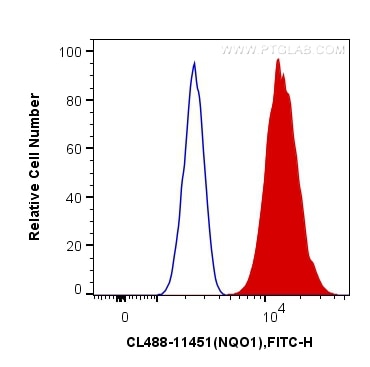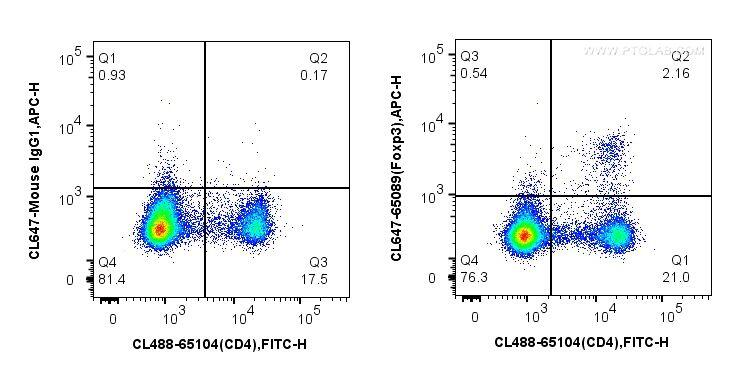- Phare
- Validé par KD/KO
Anticorps Polyclonal de lapin anti-NQO1
NQO1 Polyclonal Antibody for FC (Intra)
Hôte / Isotype
Lapin / IgG
Réactivité testée
Humain
Applications
FC (Intra)
Conjugaison
CoraLite® Plus 488 Fluorescent Dye
N° de cat : CL488-11451
Synonymes
Galerie de données de validation
Applications testées
| Résultats positifs en cytométrie | cellules MCF-7, |
Dilution recommandée
| Application | Dilution |
|---|---|
| Flow Cytometry (FC) | FC : 0.40 ug per 10^6 cells in a 100 µl suspension |
| It is recommended that this reagent should be titrated in each testing system to obtain optimal results. | |
| Sample-dependent, check data in validation data gallery | |
Informations sur le produit
CL488-11451 cible NQO1 dans les applications de FC (Intra) et montre une réactivité avec des échantillons Humain
| Réactivité | Humain |
| Hôte / Isotype | Lapin / IgG |
| Clonalité | Polyclonal |
| Type | Anticorps |
| Immunogène | NQO1 Protéine recombinante Ag2009 |
| Nom complet | NAD(P)H dehydrogenase, quinone 1 |
| Masse moléculaire calculée | 274 aa, 31 kDa |
| Poids moléculaire observé | 31 kDa |
| Numéro d’acquisition GenBank | BC007659 |
| Symbole du gène | NQO1 |
| Identification du gène (NCBI) | 1728 |
| Conjugaison | CoraLite® Plus 488 Fluorescent Dye |
| Excitation/Emission maxima wavelengths | 493 nm / 522 nm |
| Forme | Liquide |
| Méthode de purification | Purification par affinité contre l'antigène |
| Tampon de stockage | PBS avec glycérol à 50 %, Proclin300 à 0,05 % et BSA à 0,5 %, pH 7,3. |
| Conditions de stockage | Stocker à -20 °C. Éviter toute exposition à la lumière. L'aliquotage n'est pas nécessaire pour le stockage à -20oC Les 20ul contiennent 0,1% de BSA. |
Informations générales
NQO1, also named as DIA4, NMOR1, DTD and QR1, belongs to the NAD(P)H dehydrogenase (quinone) family. This enzyme apparently serves as a quinone reductase in connection with conjugation reactions of hydroquinons involved in detoxification pathways as well as in biosynthetic processes such as the vitamin K-dependent gamma-carboxylation of glutamate residues in prothrombin synthesis. It is known to be involved in benzene metabolism. In human studies of ozone exposure, polymorphisms in oxidative stress genes (NQO1, GSTM1, GSTP1) modify respiratory symptoms, lung function, biomarkers and risk of asthma. (PMID:18511640; 18848868 ) This antibody recognizes all the three isoforms (26-27 kDa and 31 kDa) of NQO1 and the homo-dimer form (66-70 kDa) of NQO1.
Protocole
| Product Specific Protocols | |
|---|---|
| FC protocol for CL Plus 488 NQO1 antibody CL488-11451 | Download protocol |
| Standard Protocols | |
|---|---|
| Click here to view our Standard Protocols |



